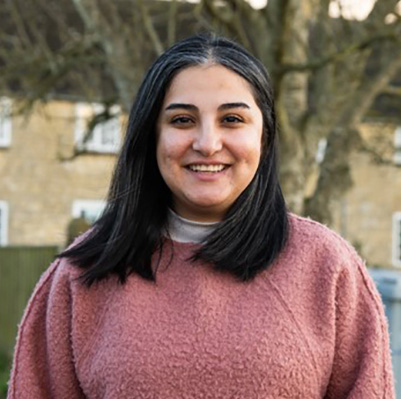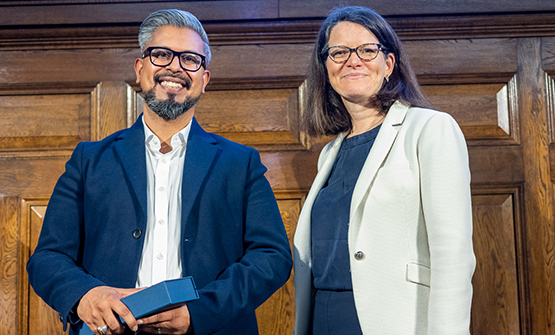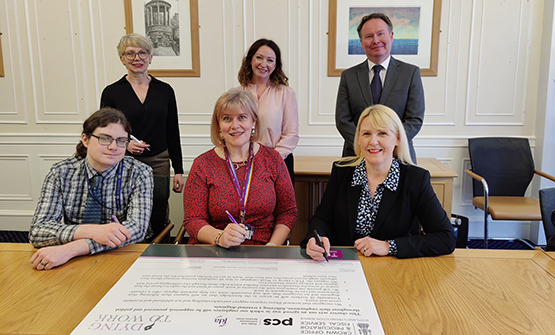The right to contribute: FDA Public Sector Development and Mentoring Scheme helps refugees enter civil service

The FDA’s Public Sector Development and Mentoring Scheme has been working alongside social enterprise Third Wave to help refugees find positions within the civil service. Tom Nathan speaks to both mentors and mentees about what they gained from the experience.
The FDA’s Public Sector Development and Mentoring Scheme (PSDMS) aims to support and improve diversity in senior roles in the civil service. The scheme usually focuses on pairing prospective applicants for places on civil service development schemes (such as the Fast Stream) with FDA mentors currently on the scheme who provide access to bespoke training on the application process. The PSDMS is run by the FDA in partnership with civil service employers and universities, helping connect us with candidates from groups currently underrepresented in senior civil service grades – including ethnic minorities and those from from lower socio-economic backgrounds.

Last year the FDA was approached by Third Wave – a social enterprise based in the North West of England dedicated to community engagement – about helping two Iranian refugees in Manchester with the right to work in the UK apply for civil service jobs.
Third Wave identified that the PSDMS is about removing barriers faced by cohorts who are not routinely getting the opportunities that their talents merit.
Ruth Passman from Third Wave explains: “Navigating the dual identity of being a professional and a refugee presents a labyrinth of challenges when seeking employment in one’s field of expertise. Forced displacement often strips individuals of more than just their homes—it disrupts careers, severs professional networks, and erodes the recognition of hard-earned qualifications”.
Maral Assadzadeh (pictured), one of the successful mentees, is a linguist who also has more than eight years of experience as an stakeholder manager in the charity sector. She had been regularly applying for various jobs in the civil service over the last eight months “with the hope to pursue and build a career.”
Despite some familiarity with the civil service recruitment system, and getting through to the interview stage and being placed on a reserve list, Assadzadeh was yet to be offered a role. At the end of 2024, Third Wave put her in touch with the FDA PSMDS mentors, who “were very helpful at giving feedback, advice and offering mock interviews that prepared me well for the interview”.
Assadzadeh has now accepted a job as an Operational Officer with Companies House. She says that she will be “forever grateful” to the mentors “for sharing their experience, wisdom and time” with her.
Joshua Hill is one of Assadzadeh’s FDA mentors and a current first year Fast Streamer. In addition to helping refugees to gain employment that suits their skillset, Hill feels that mentoring is also very beneficial for the mentor. Helping mentees through the recruitment process helps the mentor stay on-top of the recruitment process and develop their own interviewing skills, while learning from those they are mentoring.
Being a PSDMS mentor also counts towards Fast Streamers’ Corporate Objective. For Hill: “If you’re going to have to put in time for a corporate objective, it may as well be something that benefits you too”. He added being an FDA mentor offers a lot of flexibility in terms of the number of mentees you take on and “you can tailor the amount of time your spend mentoring around your own availability”.
Jada-Mae Thomas – who is a Project Support Officer within the Department for Energy, Security and Net Zero and a first year Fast Streamer – was the FDA mentor that helped the second refugee referred to the scheme by Third Wave (who cannot be named) gain an Executive Officer job within the civil service. Thomas provided tailored one-to-one mentoring sessions for the mentee, which included conducting mock interviews and assessing and providing advice on written behaviour and strength questions.
Personally, Thomas believes her work as a PSDMS mentor “has been hugely rewarding and is something I am thoroughly pleased to have been and continue to be involved in”. Being a mentor has also developed her leadership and communication skills, “having the opportunity to tailor my own work to the needs of another and provided me with the opportunity to lead interviews and provide feedback”.
Thomas added: “I believe this programme is really crucial to break down barriers to accessing interviews which may be completely different to the format used by mentees previously, and to build confidence in others so they can reach the potential that they definitely have. It is an opportunity to see different perspectives on the UK application process and how we can make this more accessible for those not originally from the UK”.
Since its inception, the FDA’s PSDMS has helped hundreds of applicants from underrepresented groups gain employment in the civil service. Using the experience and insights of current civil servants and FDA members to tap into these cohorts is a net benefit for the service in recruiting from all talent pools.
Project manager Neil Rider, who has coordinated the PSDMS for more than a decade, shared how much the FDA is “delighted to support this new work”. The PSDMS and Third Wave will continue to work together to help more refugees with professional backgrounds attain opportunities to build careers within the civil service.
Passman concludes: “For refugee professionals, reclaiming their careers is not just about economic survival – it’s a fight for dignity, identity, and the right to contribute meaningfully. Their success, however, hinges on societies choosing to see their potential, not just their past”.
Interested in finding out more or becoming a mentor?
FDA members who are currently on the Fast Stream or equivalent schemes – such as the Tax Specialist Programme – can volunteer to become PSDMS mentors.
Mentors receive full training and ongoing support from project manager Neil Rider, as well as access to courses to support them with their Development Trajectory and End of Scheme Assessments. Mentors also get the chance to support training and familiarisation events.
We also know the pressures that our Fast Stream and trainee scheme members are under – so any demands on your time will be reasonable and can fit around your availability. Taking part in the PSDMS can also count towards your corporate objectives.
Current FDA mentor Jada-Mae Thomas believes being a mentor offers “rewarding and fulfilling work outside of every-day work duties… It’s a chance to develop leadership and communication skills, experience working with people from different backgrounds and ages, and [gain] a better knowledge as a mentor of the civil service application process”.
Find out more at www.fda.org.uk/psdms or email fdalearn@fda.org.uk
Latest news
-

Scotland’s justice system needs ‘sustained further investment’
FDA National Officer Allan Sampson has warned that the “increase in funding and staffing” for the Crown Office and Procurator Fiscal Service (COPFS) “hasn’t been enough to tackle the long-term impact of a decade of underfunding dating back to 2010”.
-

Giving back: 2023 Wendy Jones Equality Award and Impact Award winners
The FDA’s Wendy Jones Equality Award and the Impact Award are presented each year at the union’s Annual Delegate Conference. Tommy Newell and Tom Nathan share details of this year’s winners and their work.
-

Procurator Fiscal Society signs Dying to Work Charter
The FDA’s Procurator Fiscal Society has joined with the Crown Office and Procurator Fiscal Service, the Scottish TUC and PCS, to sign the Dying to Work Charter.